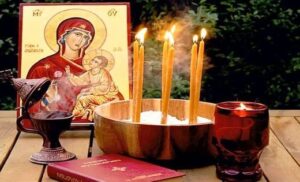3 June 2023: Memorial Saturday
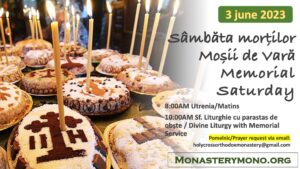
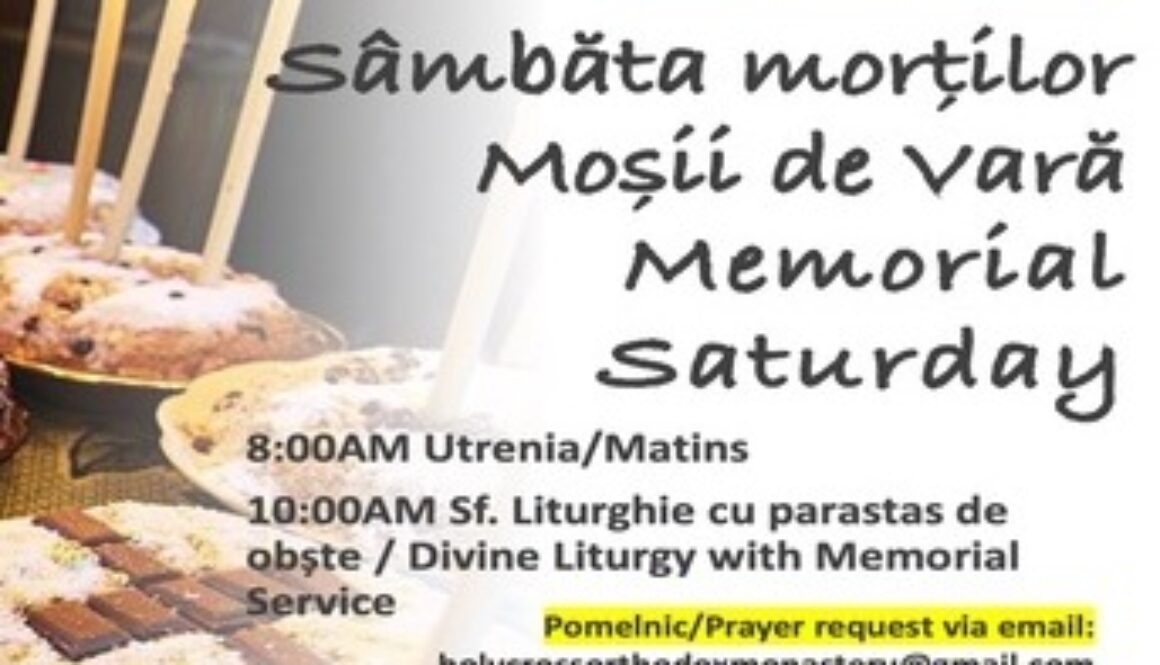
holycrossorthodoxmonastery Uncategorized

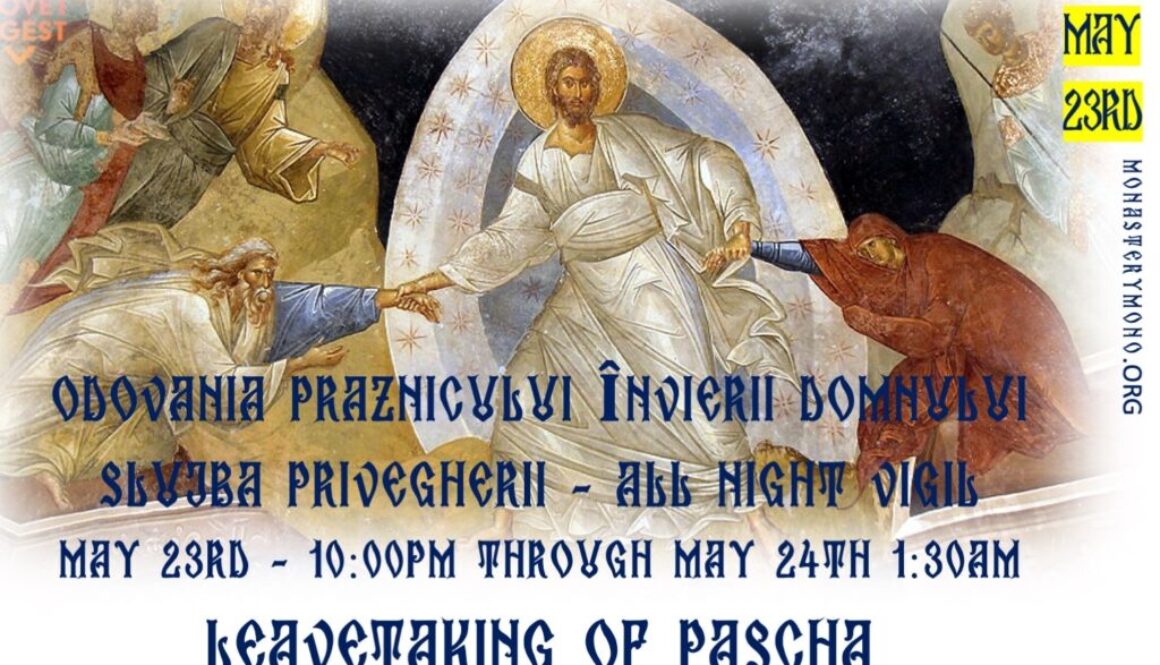
holycrossorthodoxmonastery Uncategorized
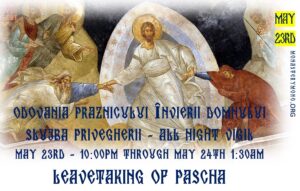
ODOVANIA PRAZNICULUI ÎNVIERII DOMNULUI
SLUJBA PRIVEGHERII -ALL NIGHT VIGIL
MAY 23RD – 10:00PM THROUGH MAY 24TH 1:30AM
LEAVETAKING OFPASCHA
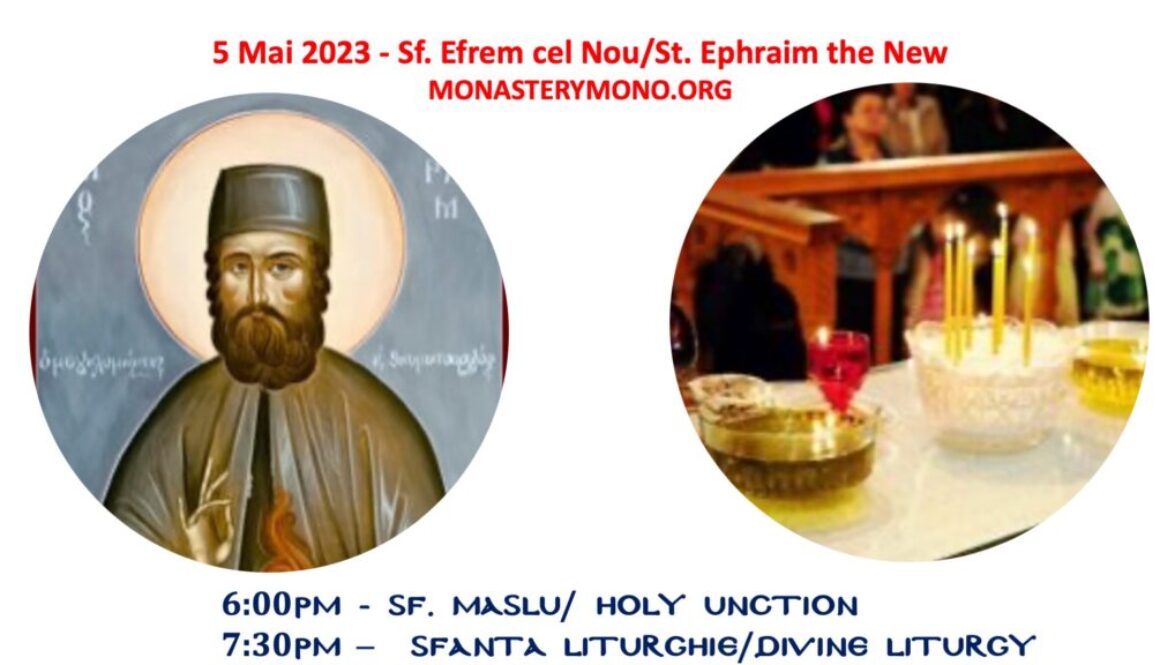
holycrossorthodoxmonastery Uncategorized
5 May 2023 – St. Ephraim the New
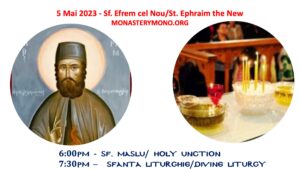
6:00pm – Holy Unction
7:30pm – Divine Liturgy
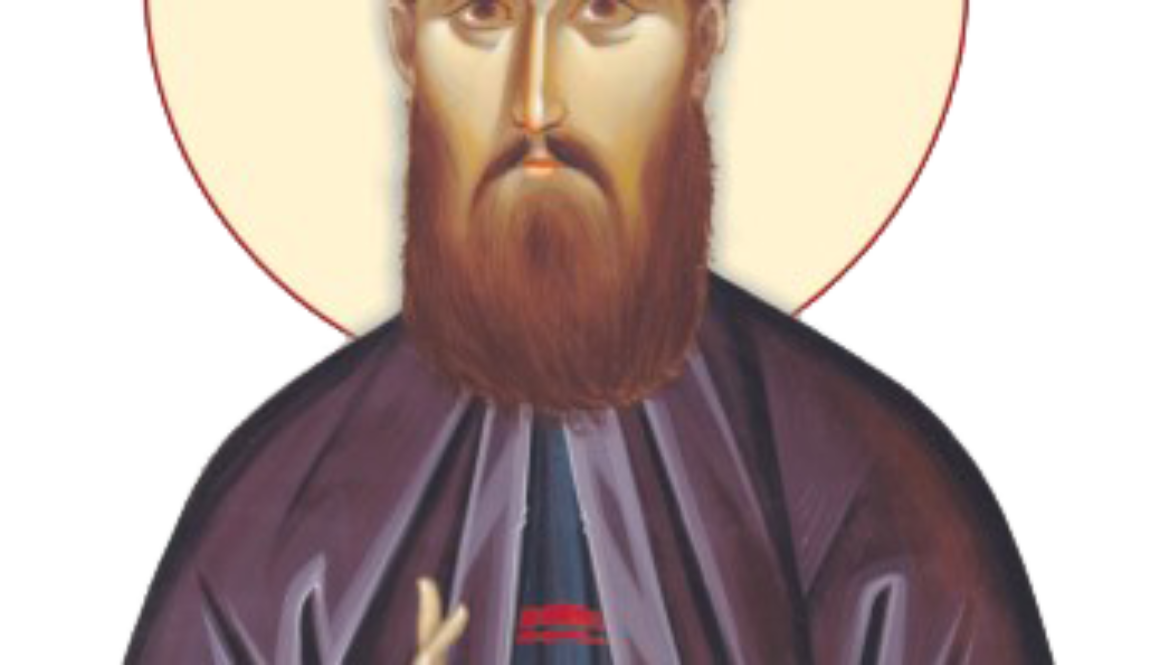
holycrossorthodoxmonastery Uncategorized
INVITATION
FEAST DAY
April 29th 2023
Annual Spring Pilgrimage Day 2023 of St. Ephraim the New at
Exaltation of the Holy Cross and St. Ephraim the New Orthodox Monastery
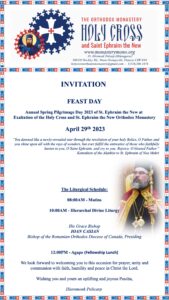
“You dawned like a newly-revealed star through the revelation of your holy Relics, O Father, and you shine upon all with the rays of wonders, but ever fulfill the entreaties of those who faithfully hasten to you, O Saint Ephraim, and cry to you: Rejoice, O blessed Father.”
Kontakion of the Akathist to St. Ephraim of Nea Makri
The Liturgical Schedule:
08:00AM – Matins
10:00AM – Hierarchal Divine Liturgy
His Grace Bishop
IOAN CASIAN
Bishop of the Romanian Orthodox Diocese of Canada, Presiding
12:00PM – Agape (Fellowship Lunch)
We look forward to welcoming you to this occasion for prayer, unity and
communion with faith, humility and peace in Christ the Lord.
Wishing you and yours an uplif
Hieromonk Policarp
—
Mănăstirea Ortodoxă Înălțarea Sfintei Cruci și Sf. Efrem cel Nou
The Orthodox Monastery Exaltation of the Holy Cross and St. Ephraim the New
E. holycrossorthodoxmonastery
New Website: www.
Join our Facebook page: https://www.facebook.
Episcopia Ortodoxă Româna a Ca
The Orthodox Monastery “Holy Cross” is under the spiritual and ecclesiastical authority (omofor) of His Grace, Bishop Ioan Casian, of The Romanian Orthodox Diocese of Canada.
Mitropolia Ortodoxă Română a celor două Americi / The Romanian Orthodox Metropolia of the Americas
INVITATION to Save the Dates in 2023:
- 29 aprile 2023 – Hramul Mic/Annual Spring Pilgrimage Day (Sf. M. Mc. Efrem cel Nou/St. Ephraim the New)
- 22 iulie 2023 – Pelerinaj în cinstea Maicii Domnului (Icoana “Gherontissa”) / Annual Summer Pilgrimage Day in honor of our Mother of God
- 16 septembrie 2023 – Hramul Mare/Annual Fall Pilgrimage Day (Înălțarea Sfintei Cruci/Exaltation of the Holy Cross)
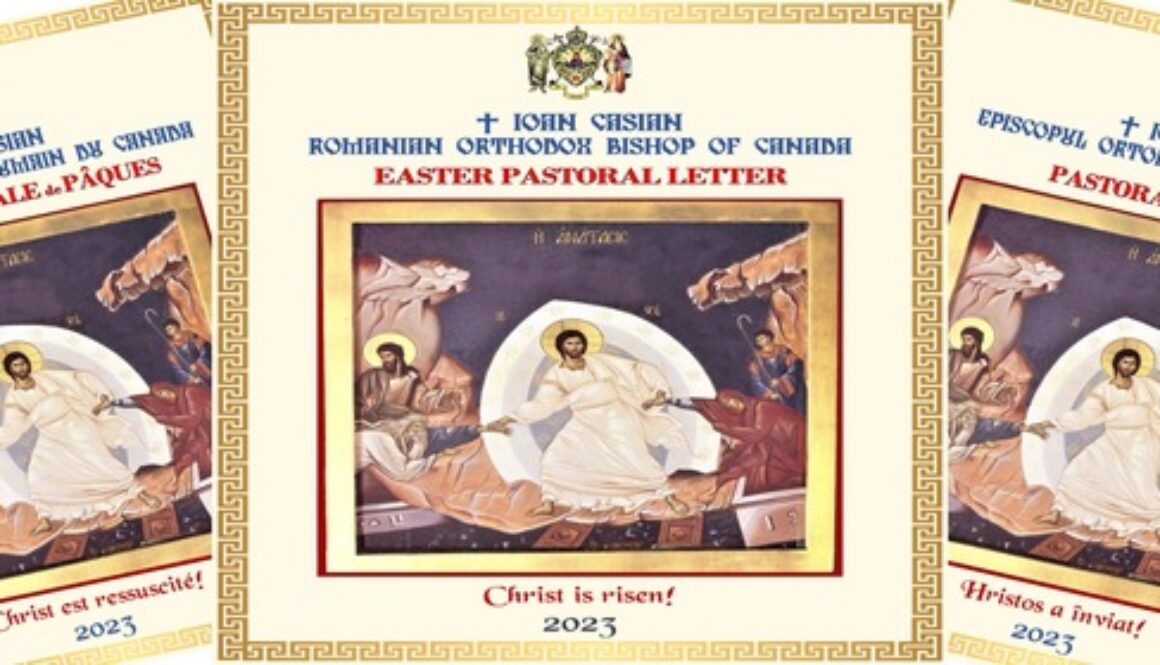
holycrossorthodoxmonastery Uncategorized
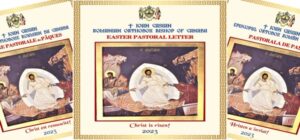
PASTORAL LETTER
AT THE FEAST OF THE LORD’S RESURRECTION, 2023
† IOAN CASIAN
By the mercy of God
Bishop of the Romanian Orthodox Diocese of Canada,
to our Beloved clergy and Orthodox Christians,
peace and joy from Christ, the Risen Lord,
and from us, hierarchical blessing!
“And as they went to tell His disciples, behold,
Jesus met them, saying, “Rejoice!”
So they came and held Him by the feet and worshiped Him.”
(Matthew 28, 9)
Most Reverend Fathers,
Beloved brothers and sisters,
Christ is risen!
The Feast of the Resurrection of our Lord is an event of encounter and discovery. It is the moment when Christ comes to meet the disciples and the myrrh-bearing women surprising them. It is the revelatory moment that reawakens the understanding and brings the eye of the witnesses back into the presence of truth, restoring true sighting and knowledge. Christ by His resurrection performs a miracle that changes something fundamental in the ontology of our sinful human nature after the fall. He operates a change in the ontology of the logic of sin, of nature touched by death and passion. He conquers death and restores human life to its natural, original, God-given rights at creation.
How does Christ do this?
This is what St. Ephrem the Syrian tells us: “He came down from on high as Lord, from the womb He came out as a slave. Death knelt before Him and in His resurrection, life worshiped Him. Blessed be His victory!”[1] Christ overcomes on two levels. He shows Himself as Lord and Creator. Man has God in front of him. But the sighting and the understanding of Him as God becomes accessible to man through the incarnation. Christ is born of the Virgin Mary becoming like one of us, similar in everything except sin.[2] Christ is at the same time God and man. Divinity comes to encounter man, discovering or revealing itself. But this could not be done in a simple and direct way because God says to Moses in the Old Testament: “You cannot see My face; for no man shall see Me, and live.” (Exodus 33, 20). God offers a possibility to solve this difficulty – His incarnation. This opens the possibility for man to draw near to God and to contemplate Him. Our human nature taken by Him from the Virgin Mary thus becomes the hand of God or the medium through which man can glimpse Him and His work and live.
Through incarnation two things happen: first – the prerequisites for the defeat of death are laid. The death will be defeated by the resurrection. By the incarnation death subdues its tyranny over life because it feels the breath of eternal life approaching; the second – in the resurrection, life regains its true reason and submits to the Eternal One, understanding that the Incarnate One is eternity. He is the true finality of man’s life.
Why can Christ do these things? Who is Christ?
“From God comes His Divinity and from mortals His humanity; from Melchizedek His priesthood, and from the house of David His kingdom. Blessed be their mingling in Him!”[3] – says St. Ephrem the Syrian. Christ unites heaven and earth. In His unique person or hypostasis, the divine nature and the human nature are united unmixed, unchanged, undivided, inseparable.[4] In Christ, divinity met humanity, priesthood met the kingdom. Christ is the full person who unites God with man, priestly service with kingship. That is why Christ through incarnation, suffering, death, and resurrection restores man’s serving to God fully. First it restores the synergistically working unity of the human nature with the divine one in incarnation. And then it restores man’s serving as priest and his ruling power as the crown of creation and its steward.[5] The logic of sin, which means rebellion and unrighteousness before God, is abolished by the union of the two natures in the unique person of the Son of God and by the restoration of man as the priest of God within creation. He represents the image of God among the creatures of the world. Just as God through providence rules this world, man is also called to rule the things of the world over which he is put in charge through the wisdom that God has given him.
What does the mystery of Easter mean to us humans?
“He (i.e., Christ) – says St. Melito of Sardis – is everything: law because He judges, word because He teaches, grace because He saves, Father because He begets, Son because He is born, sheep because He suffers, man because He is buried, God because raise from the dead. This is Jesus Christ; to Him be the glory forever. Amen. This is the mystery of the Easter, as written in the Law (…).”[6] Christ encompasses us all. He includes in His person and life, in His deeds, all that is necessary for our salvation. He is the One who orders everything according to the law He has made for us all. He reveals to us God and the deep founding reasons of the world and human existence. He is the One who bestows divine grace on the world, the grace of existence and of restoration towards salvation and eternal life. He begets us as a Father to new and eternal life. He is Son as the One who is born from the Father but also from the Virgin as a man. He is the oblation that brings offering on our behalf. He is buried as a man to bury our sinful humanity. He raises from the dead as God to restore eternal life to man who lost it through sin and disobedience. The mystery of Easter is the mystery of the total transfiguration of man granted by Christ the Son of God to man as a gift and which he can appropriate through faith and manifest through good deeds.
How does Christ restore our nature in His Person?
“This one (i.e. Christ), – says St. Melito -, coming from heaven to earth for the one who was suffering, vesting Himself in that one through a Virgin Mother and coming out as a man, suffered the passions of the one who suffered and through the body that could suffer destroyed the passions of the body, and by His Immortal Spirit He put an end to man’s destructive death.”[7]Christ came down from heaven and took the human nature from the Virgin Mary. In this way He became solidary with us, becoming one of us, to work our salvation. By taking human nature from the Virgin Mary in His person, He appropriated the passions of our sinful and passionate flesh, correcting and healing them. But He accomplishes even more. He restores eternal life to man through the Holy Spirit, eternal Spirit and restorer of the divine life which is man’s vocation. Christ Himself in His Person and through His works becomes the foundational ground for the restoration and salvation of every individual. All the necessary things are fulfilled first in His Person so that later this work can be poured into those who want to follow His way.
Beloved faithful,
“His birth is for us purity, His baptism for us atonement – says St. Ephrem the Syrian; His death to us is life and His ascension to us is exaltation. How grateful we must be to Him!”[8] Christ through His work accomplishes everything for the restoration of man. Through the incarnation He cleanses our human nature because He is born without male seed and without sin and its consequences. Through baptism it is not He who is cleansed, but He is the One who sanctifies the waters and our nature and forgives our ancestral sin. He sanctifies the whole creation by the grace He bestows. His death is the death of the human body in which the consequences of sin are present. “Christ is risen from the dead, trampling down death by death, and on those in the tombs bestowing life!” says the troparion of the Easter canon. Through suffering and death, He crucified and buried the body of sin so that on the third day it would rise from the dead with the body transfigured by the power of divinity. The body is restored by His resurrection to its natural state, not subject to the logic of sin and passions, immortal, deified, sinless, transfigured, and worthy to be the abode of the Holy Spirit. And by ascending to heaven, Christ brings man in the depth and intimacy of the connection with God. It is the resurrection of Christ that transfigures everything in view of the kingdom of God.
“Thus, let’s celebrate this feast, in which Christ is risen from the dead – says St. John Chrysostom. Because He ascended, and humanity also rose with Him. And on the one hand He has risen by breaking the bond of death, and He also has risen us, untying the bonds of our sins.”[9] The time of Easter feast is the time of blessing and the fulfillment of promises. It is time to untie the bonds of sin. Man acquires a new understanding, a spiritual one, different from the passionate one. Instead of hatred, man receives and learns from Christ true love. Instead of his own selfishness and exaggerated self-concern man is urged to learn to be merciful. Instead of living under the heavy darkness of sin, man through Christ acquires the forgiveness of sins, freeing his conscience from the spiritual blindness that keeps him away from God and the fulfillment of His will. The fruits of sin and the passionate flesh are impurity, enmity, quarrels, divisions, heresies, wrath, and others.[10] On the contrary, the fruits of the Spirit are love, joy, peace, long-suffering, kindness, doing good, faith, gentleness, self-control, purity.[11] In the words of St. Paul the Apostle we see that the fruits of the spiritual man are different from those of the carnal man. The logic of sin with its destructive effects is reversed with the logic of holiness and deification which is man’s true vocation.
Let’s follow the exhortation of St. Gregory the Theologian: “Let us bring ourselves as fruits, as the most precious and natural building of God, let us restore the ‘face’ to the image, let us know our value, honor our prototype, understand the power of the mystery and why Christ died. Let’s make ourselves like Christ, because Christ also became like us, let’s make ourselves gods for Him, because He also became man for us (…) Let’s give everything to Him, let’s each offer everything to Him Who gave Himself to us, as Savior and Redeemer, for our sake”[12] because “I am not scared, I am not afraid of war, nor do I consider my helplessness, but I rely on the unspeakable power of the One Who is going to support me in the battle.”[13]
If we look at our surrounding reality, we can ask ourselves with St. Nicholas Velimirovich: “How do we say that the Risen Lord has conquered death, since people are still dying?”[14] But he also gives us the answer: “Those who entered this world through their mother’s womb will leave it through death and the grave. This is the law. But for us who die in Christ, death is not a dark abyss, it is birth to new life, it is homecoming. For us the grave is not endless darkness, but the gate at which the shining angels of God await us. For those filled with the love of Christ, the grave is only the last obstacle to His presence (…) The grave is no longer an abyss because He filled it with Himself; it is no longer dark because He has illuminated it; there is no more terror because it is no longer a sign of the end but of the beginning; nor is the grave our eternal home, for it is only the door that leads there. … Christ’s victory is fundamental; through Him death was swallowed up in victory (1 Corinthians 15, 54).”[15] The resurrection of Christ totally changed the meaning of death. It is no longer the end of human failure due to the temptation of disobedience and the fall. The grave became a stage towards the resurrection. He is a necessary stage in stripping off the old man and putting on the new man. He is the way that leads us to the encountering with the Creator and the Lord. The grave after Christ’s resurrection is filled with the joy of the presence of the grace of Christ’s new life.
Let us also exclaim with St. Ephrem: “Who is for us, Lord, like You? Mighty, Who has shrunk, Watcher, Who has fallen asleep. Righteous One, Who was baptized, Living One, Who died, King, Who was mocked, to give glory to all! Praised be Your glory!”[16] Christ become all things to all that He may save us.
Dear brothers and sisters,
Let’s follow the call to encounter and know Christ like the disciples to be able to witness Him like them to the whole world: “Come, therefore, all tribes of people hardened in sins, and receive the forgiveness of sins. For I am your forgiveness, I am the Passover of salvation, I am the lamb slain for you, I am your redemption, I am your life, I am your resurrection, I am your light, I am your salvation, I am your king. I will take you to the highest heavens, I will show you the eternal Father, I will raise you up by My righteousness.”[17]
Let us approach with joy and a pure heart and embrace Christ-God: “Behold – says St. John Chrysostom -, the desired and saving celebration has come, the day of the Resurrection of our Lord Jesus Christ, the foundation of peace, the cause of reconciliation, the cessation of wars, the trampling of death, the defeat of the devil.”[18]
Let’s lay a good foundation for our thoughts and deeds through the Resurrection of Christ, so that “by deeds and words I may cry to You unceasingly: You are Lord and our God!”[19]
On the Feast of the Resurrection of the Lord, let us give glory to Christ the Lord who rose from the tomb on the third day, let us thank Him for the gift of resurrection and knowing him through faith.
I wish you all, in this bright Easter period, help from God and spiritual blessing, peace in the souls and in the world and love between us and between peoples.
“Greet one another with a kiss of love. Peace to you all who are in Christ Jesus. Amen.” (1Peter 5, 14).
CHRIST IS RISEN!
Yours, everyone’s, willing all good,
† IOAN CASIAN
Saint-Hubert / Montreal 2023
________
[1] Hymn 8 (1), p. 234 in St. Ephrem the Syrian. Hymns De Ieiunio, De Azymis, De Crucifixione et De Resurretione (introductory study and translation by deacon Ioan I. Ică jr), Ed. Deisis: Sibiu 2010
[2] Hebrew 4, 15
[3] Hymn 12 (1), p. 234
[4] The dogmatic definition of the union of divine and human natures in the person of Christ with the preservation of the characteristics of each (IV Ecumenical Synod 451, Chalcedon)
[5] Genesis 1, 28; 2, 15
[6] St. Melito of Sardis. On Easter (9) in St. Ephrem the Syrian. Hymns..., p. 32
[7] St. Melito (66), p. 40
[8] Hymn 16 (1), p. 235
[9] St. John Chrysostom. Sermon on Easter Sunday, p. 15 in Sermons of the Holy Fathers on Sundays over the year.Egumenita Publishing House: Galati 2009
[10] Galatians 5, 19-21
[11] Galatians 5, 22-23
[12] St. Gregory the Theologian. Sermon on Easter Sunday, pp. 10-11 in Sermons of the Holy Fathers.
[13] St. John Chrysostom, p. 13
[14] Resurrection Day, p. 218 in St. Nicholas Velimirovich. Sermons. Ileana Publishing House: Bucharest 2006
[15] ibidem
[16] Hymn 22 (1), p. 236
[17] St. Melito (103), p. 45-46
[18] Sermon on Holy Easter, p. 148 in St. John Chrysostom. Sermons on Royal Feastdays and Eulogies for Saints, EIBMBOR Publishing House: Bucharest 2006
[19] On Thomas’ touching, p. 128 in St. Romanos the Melodist. Theological hymns. Doxologia Publishing House: Iasi 2012

holycrossorthodoxmonastery Uncategorized
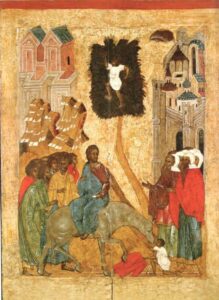
Feast of the Entrance of Our Lord Jesus Christ into Jerusalem – Palm Sunday
Praznic binecuvânta/Blessed feast day!
9 APRIL 2023
8:30AM – Utrenie/Matin
10:30AM – Dumnezeiasca Liturghie/Divine Liturgy with Palm Sunday procession
12:30PM – Agapă/Fellowship Lunch ( în cinstea praznicului Intrări Domnului în Ierusalim – Floriilor / honoring the Feast of the Entrance of Our Lord Jesus Christ into Jerusalem – Palm Sunday )
—
Prayerfully yours in Christ’s service,
Întru Hristos Domnul,
Fr. Hieromonk Polycarp
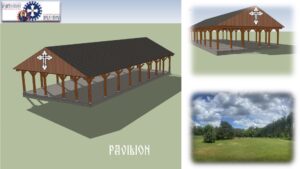
INVITATION to Save the Dates in 2023:
- 29 aprile 2023 – Hramul Mic/Annual Spring Pilgrimage Day (Sf. M. Mc. Efrem cel Nou/St. Ephraim the New)
- 22 iulie 2023 – Pelerinaj în cinstea Maicii Domnului (Icoana “Gherontissa”) / Annual Summer Pilgrimage Day in honor of our Mother of God
- 16 septembrie 2023 – Hramul Mare/Annual Fall Pilgrimage Day (Înălțarea Sfintei Cruci/Exaltation of the Holy Cross)
—
Mănăstirea Ortodoxă Înălțarea Sfintei Cruci și Sf. Efrem cel Nou
The Orthodox Monastery Exaltation of the Holy Cross and St. Ephraim the New
E. holycrossorthodoxmonastery
New Website: www.
Join our Facebook page: https://www.facebook.
Episcopia Ortodoxă Româna a Ca
The Orthodox Monastery “Holy Cross” is under the spiritual and ecclesiastical authority (omofor) of His Grace, Bishop Ioan Casian, of The Romanian Orthodox Diocese of Canada.
Mitropolia Ortodoxă Română a celor două Americi / The Romanian Orthodox Metropolia of the Americas
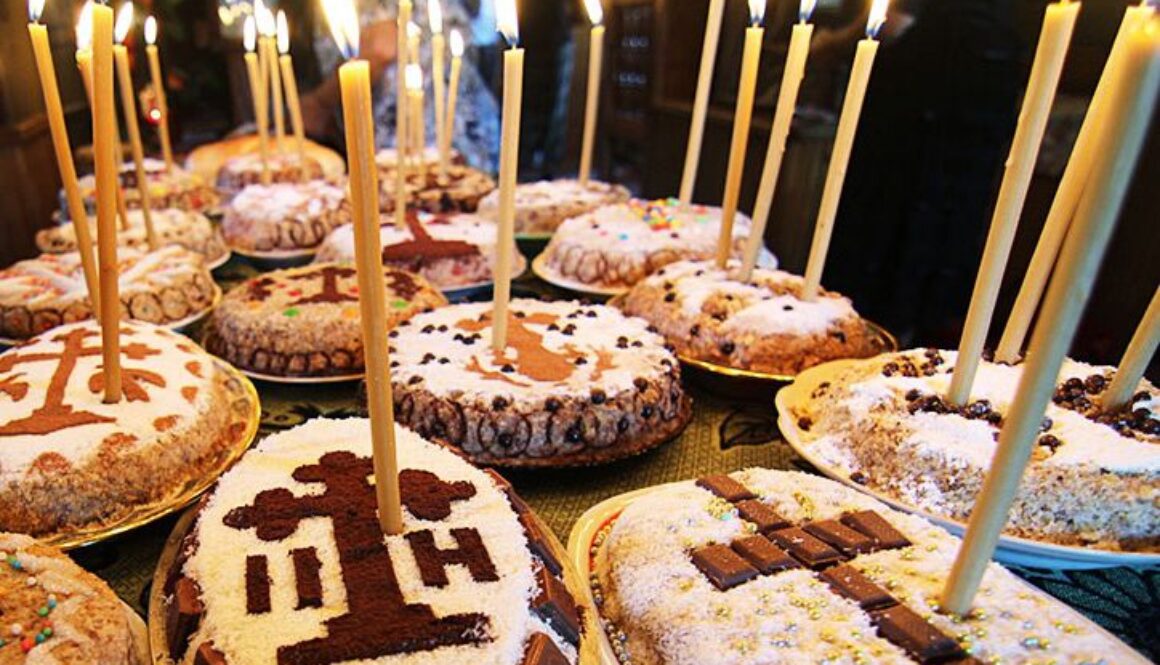
holycrossorthodoxmonastery Uncategorized
Saturday April 8th 2023 :
8:30 am – Orthros/Matins
10:30 am – Divine Liturgy with Memorial Service
“Give rest, O Christ, among the Saints to the souls of Your servants, where there is no pain, no sorrow, no grieving, but life everlasting.”
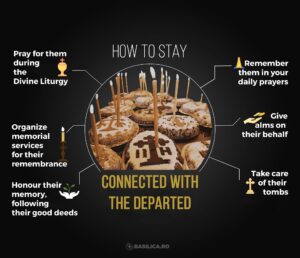
Mănăstirea Ortodoxă Înălțarea Sfintei Cruci și Sf. Efrem cel Nou
The Orthodox Monastery Exaltation of the Holy Cross and St. Ephraim the New
– Petitions for prayer may be sent via email: holycrossorthodoxmonastery
– Donations can be made by check or by electronic transfer
Cell: 226.200.1074
T. (519) 942-3489 E. holycrossorthodoxmonastery
New Website: www.
Join our Facebook page: https://www.facebook.
“The Orthodox Church prays for those of its members who may have died unexpectedly because of wars, plagues, starvation, or any other sort of death while they were in a foreign country, or while they were traveling by sea, by land, or by air. The Church also prays for the poor, or for those who may not have received a proper burial, or who had no one to request Memorial Services to be offered for them.
We pray for the departed on this Saturday because the Orthodox Church has established Saturday as the proper day of the week for remembering the dead. On this day before we hear the Gospel about the Last Judgment, we should pause to recall our own inescapable death when we shall appear before Christ to give an account of our lives. May we have “an acceptable defense before His dread Judgment Seat.”
As we prepare for the spiritual struggles of the Great Fast, we should remember that we have been given this present life for repentance and for entreating God’s mercy. When Christ comes in glory to judge the world, it will be too late then to say that we repent, or to ask for mercy. Therefore, we should make the most of the time that has been given us in order to struggle against every sinful impulse which separates us from God, to confess our sins, to correct ourselves, and to pursue a life of virtue and holiness.
During the week leading up to Meatfare Sunday, we do not sing “Alleluia” in place of “God is the Lord,” at Matins. “Alleluia” is appointed to be sung on the Wednesday and Friday of Cheesefare Week, and also during Great Lent. See the TYPIKON or the OCA rubrics book for information about the structure of the pre-Lenten and Lenten services. ” (text: OCA.org)
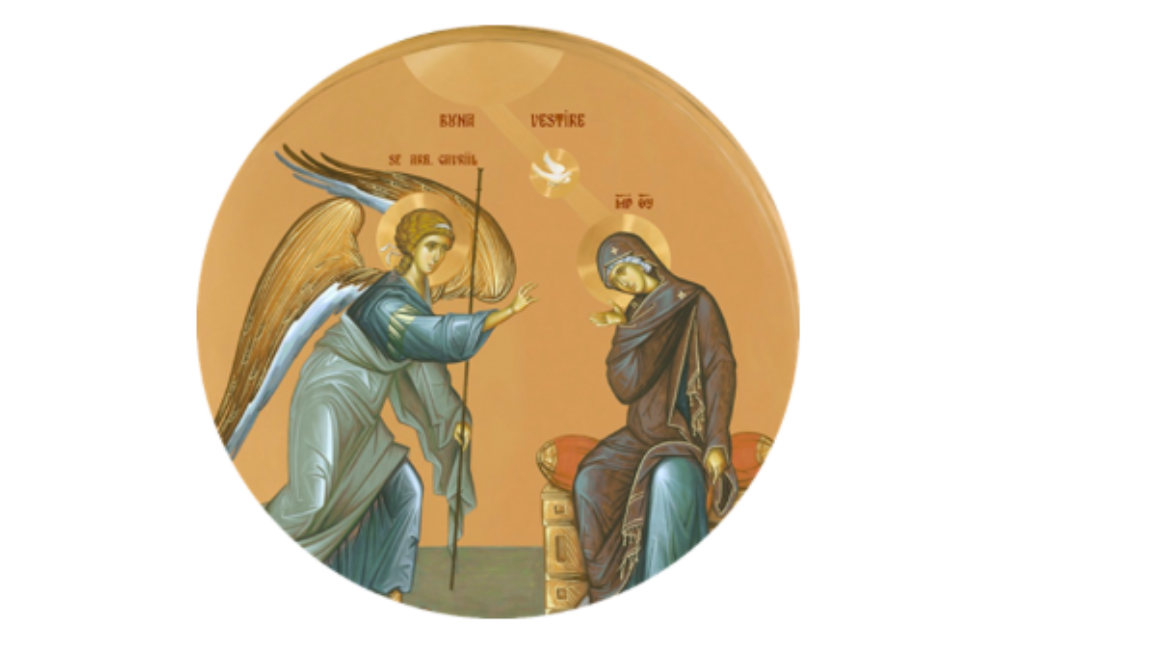
holycrossorthodoxmonastery Uncategorized
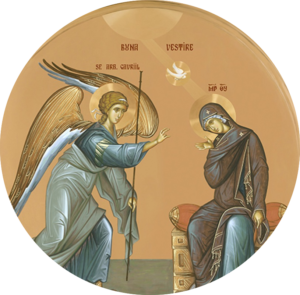
Praznic binecuvânta/Blessed feast day!
25 MARTIE/MARCH 2023
8:30AM – Utrenie/Matin
10:30AM – Dumnezeiasca Liturghie/Divine Liturgy
12:00PM – Agapă/Fellowship Lunch
( în cinstea praznicului Bunei Vestiri/in honor of the Annunciation of our Most Holy Lady, the Mother of God and Ever-Virgin Mary)
BINECUVINTEAZĂ DOAMNE TOATE MAMELE CREȘTINE!
BLESS O LORD ALL THE CHRISTIAN MOTHERS!
—
Prayerfully yours in Christ’s service,
Întru Hristos Domnul,
Fr. Hieromonk Polycarp
Donations Altar de Vară/Pavilion
INVITATION to Save the Dates in 2023:
- 29 aprile 2023 – Hramul Mic/Annual Spring Pilgrimage Day (Sf. M. Mc. Efrem cel Nou/St. Ephraim the New)
- 22 iulie 2023 – Pelerinaj în cinstea Maicii Domnului (Icoana “Gherontissa”) / Annual Summer Pilgrimage Day in honor of our Mother of God
- 16 septembrie 2023 – Hramul Mare/Annual Fall Pilgrimage Day (Înălțarea Sfintei Cruci/Exaltation of the Holy Cross)
—
Mănăstirea Ortodoxă Înălțarea Sfintei Cruci și Sf. Efrem cel Nou
The Orthodox Monastery Exaltation of the Holy Cross and St. Ephraim the New
E. holycrossorthodoxmonastery
New Website: www.
Join our Facebook page: https://www.facebook.
Episcopia Ortodoxă Româna a Ca
The Orthodox Monastery “Holy Cross” is under the spiritual and ecclesiastical authority (omofor) of His Grace, Bishop Ioan Casian, of The Romanian Orthodox Diocese of Canada.
Mitropolia Ortodoxă Română a celor două Americi / The Romanian Orthodox Metropolia of the Americas

holycrossorthodoxmonastery Uncategorized
PASTORAL VISIT OF HIS GRACE BISHOP IOAN CASIAN
Sunday March 12th 2023 :
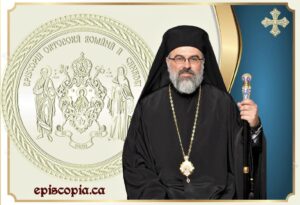
Sunday March 12th 2023 :
8:30 am – Orthros/Matins
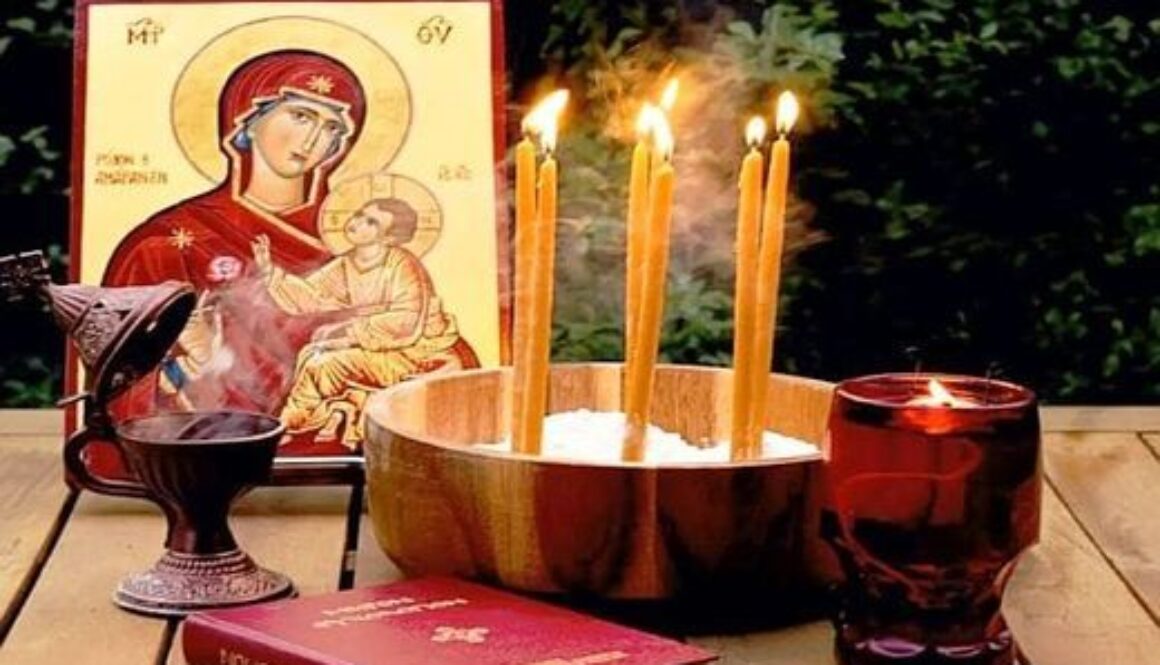
holycrossorthodoxmonastery Uncategorized
